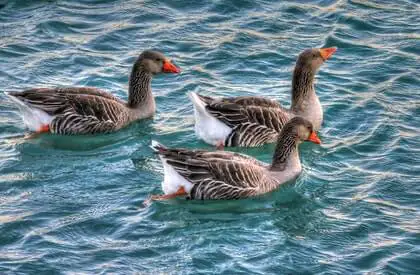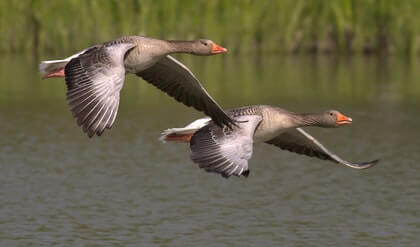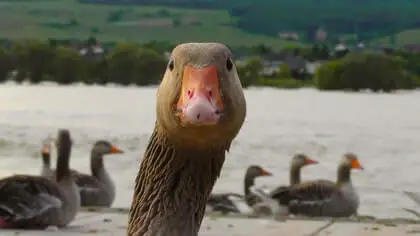When the winter months are in full swing, it can be difficult to keep your geese warm. Geese are large birds that need to be provided with shelter in the winter. Geese are social creatures, so they require company during the cold months.

If you live in a colder climate, there are special considerations that need to be taken into account.
Geese have downy feathers all over their bodies that help them stay warm in the summertime, but they need an extra layer of protection when the temperature starts dropping below freezing.
Below are some tips for keeping your flock cosy and healthy during these cold months.
- Be sure to provide shelter from wind and rain at all times.
- Give them access to clean water at any time of day or night by placing bowls close by or attaching waterers above ground level so they don’t freeze over too much during the day.
- Provide them with a covered porch or other form of overhead protection from rain and snow.
- Make sure their bedding is dry after it rains or snows by providing an area for drainage under their perch. A layer of straw on top of wood shavings helps retain heat while preventing ice build-up on their feathers when it’s really cold outside.Provide a wind break by planting shrubs around the perimeter of their shelter
- It’s also a good idea to build them an insulated sleeping house with straw that they can crawl into if they want to sleep alone .
- Geese have oil glands on their skin that produce a “waterproofing” substance which keeps them warm and dry. Regularly check your goose’s oil glands to make sure they aren’t clogged with dirt or debris.
- Geese also need access to food year-round, so it’s important keep their feed available at all times during the winter months. Clean up spilled feed regularly to prevent mold and bacteria growth.
How do geese survive extreme cold
Harsh winter weather is a fact of life for most northern hemisphere dwellers. Those who live in colder climates know that it can be difficult to keep pets happy and healthy during the cold months.
One animal that seems to stand up well against the worst winter has to offer is the goose, with its thick feathers and downy undercoat. However, geese don’t just survive extreme cold; they thrive in it.

Indeed, the wild geese are known for changing their migration patterns in order to stay in cold climates during winter.
The key to a goose’s warmth is its feathers. Geese have an extremely dense layer of feathers that keeps them protected from harsh winds and chilly temperatures. In fact, most breeds of domesticated geese grow even more feathers during the colder months.
Underneath this dense layer of feathers, geese have a thick layer of down that acts as an insulation against the cold. Ducks and other waterfowl also grow downy feathers during winter, but their coats are not nearly as thick or warm as those of geese
Another thing that sets geese apart is that they have oil glands that produce an oily substance that coats their feathers and keeps them waterproof. This oil provides another layer of warmth for geese, as well as making it easier to clean up after them during the cold months when slush is everywhere.
What to feed geese in winter
Geese are opportunistic eaters and will consume a wide variety of foods. However, if they are being fed exclusively plant-based food sources, this can lead to malnutrition due to a lack of protein in the diet.
It’s important that geese have access to animal proteins so that they maintain proper health throughout the winter months when food is scarce.

The best thing you can do is give them a good source of protein – like meat or eggs – as well as vegetables and grains, just like humans, need nutritious meals with carbs, proteins and vitamins to stay healthy.
Geese are expert survivalists, and that applies to fending off the chilly temperatures of winter as well.
Following a few simple rules ensure a happy, healthy flock throughout the winter months.
What temperature is too hot for geese
Geese are very sensitive creatures, and like all animals, they need to be comfortable in order to thrive.
The optimal temperature for geese is 20°C. Anything above this will cause them great discomfort and can even prove fatal.
If you want your geese to live a long life of cooing joyfulness, it’s important that you keep their environment at 20°C or cooler.
